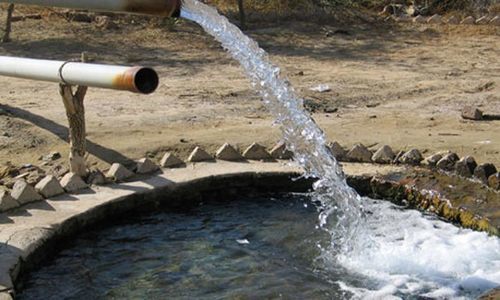KARACHI: Concerns over contamination in groundwater in Pakistan are real and the problem needs immediate attention, but a recent report about risk of arsenic poisoning seems to be suffering from “gross overestimation”, according to experts Dawn spoke to on Friday.
They were talking to this reporter against the backdrop of the report which suggested that about 50 million Pakistanis were at risk of falling victim to arsenic poisoning.
The Swiss Federal Institute of Aquatic Science and Technology had carried out the study whose findings were published recently in the Science Advances journal.
Some researchers feel that country’s surface water is also unsafe for drinking
According to Prof Zafar Fatmi of the Aga Khan University’s (AKU) department of community health sciences, the report was “a gross overestimate” and that there were “methodological concerns” associated with it.
“No previous report corroborates its findings, according to which about half the samples (49.8 per cent) had more than 10ppb of arsenic,” he said.
“Secondly, if half of our wells are contaminated then we should have proportionate adverse health effects [among the population]. I would assume that there is gross sampling bias.
“Most samples have been taken [from areas] along the Indus, which are supposed to have contamination. However, the data has been extrapolated for the overall population of Pakistan.”
Research methodology
The methodology, he pointed out, suggested that the researchers had carried out geographical sampling by dividing the country into areas of “1km by 1km”. But their mapping showed that only those areas were chosen which existed along the river.
Citing the work carried out by his team to study arsenic contamination in Khairpur, Prof Fatmi said the district was situated along the Indus river. “Of the total 2,500 samples collected, we found contamination more in samples taken from places along the river. Only one to two of the samples taken further away were found to be contaminated.”
According to him, the risk assessment based on GIS mapping showed that about 13m people were likely to have arsenic exposure in Pakistan.
“Geological distribution of arsenic in underground water is interesting. You would find safe wells close to contaminated wells within the same geographical areas. Therefore, it is unfair to label the whole 1km by 1km area as exposed, based on one to two samples,” he argued.
He said that only one study was conducted by AKU on the adverse effects of arsenic contamination on the people’s health, in which “we looked at the frequency of skin lesions typically associated with arsenic”.
“We found arsenic skin lesions at higher concentrations i.e. about 100ppb and above and the population exposed at those high levels was small,” he said.
Dr Ghulam Murtaza of the Pakistan Council of Research in Water Resources (PCRWR) said he couldn’t agree completely with the report because he didn’t know how sampling was done. “There is no doubt that there are many areas in both Punjab and Sindh with high levels of arsenic contamination. If the study has focused on the affected areas, then naturally results would show high levels of arsenic contamination,” he said.
About arsenic contamination in Punjab, Zamir Ahmed Soomro of PCRWR, Lahore, said the government had started a ‘clean water project’ which aimed to address this problem as well.
“Districts like Lahore, Kasur, Bahawalpur, Sahiwal, Rahim Yar Khan and Muzaffargarh, situated along the river course, have water with high arsenic contamination.”
Arsenic in surface water?
Researchers like Dr Mohammad Uzair Khan and Dr Fahim Siddiqui believe that the country’s surface water is also not safe for drinking.
To prove the point, Dr Khan, who is currently associated with Karachi University, refers to a study he carried out with his team recently, which indicates that the Indus bodies, from the northernmost territory of Gilgit-Baltistan to the lower parts of Sindh, are getting contaminated with high levels of lead and arsenic.
Published in Dawn, August 26th, 2017














































